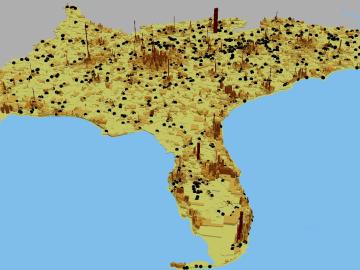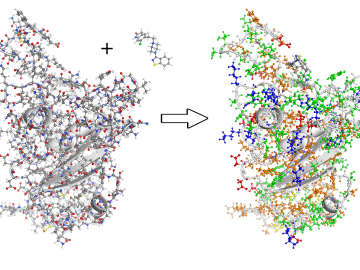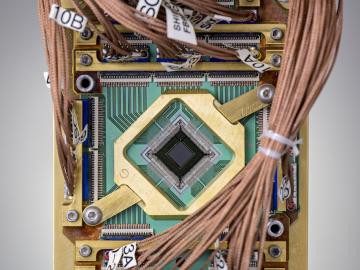
Filter News
Area of Research
- (-) National Security (80)
- (-) Supercomputing (319)
- Advanced Manufacturing (34)
- Biological Systems (18)
- Biology and Environment (180)
- Biology and Soft Matter (5)
- Building Technologies (12)
- Chemical and Engineering Materials (4)
- Chemistry and Physics at Interfaces (11)
- Computational Biology (6)
- Computational Chemistry (5)
- Computational Engineering (5)
- Computer Science (19)
- Data (1)
- Electricity and Smart Grid (3)
- Energy Frontier Research Centers (14)
- Energy Science (526)
- Energy Sciences (5)
- Fossil Energy (3)
- Fuel Cycle Science and Technology (3)
- Functional Materials for Energy (16)
- Fusion and Fission (55)
- Fusion Energy (19)
- Geographic Information Science and Technology (3)
- Isotope Development and Production (3)
- Isotopes (36)
- Materials (433)
- Materials Characterization (2)
- Materials for Computing (36)
- Materials Synthesis from Atoms to Systems (13)
- Materials Under Extremes (12)
- Mathematics (1)
- Neutron Data Analysis and Visualization (4)
- Neutron Science (212)
- Nuclear Science and Technology (75)
- Nuclear Systems Modeling, Simulation and Validation (3)
- Nuclear Systems Technology (1)
- Quantum Condensed Matter (4)
- Quantum information Science (9)
- Reactor Technology (1)
- Sensors and Controls (5)
- Transportation Systems (11)
News Type
News Topics
- 3-D Printing/Advanced Manufacturing (7)
- Advanced Reactors (2)
- Artificial Intelligence (46)
- Big Data (25)
- Bioenergy (11)
- Biology (14)
- Biomedical (17)
- Biotechnology (3)
- Buildings (4)
- Chemical Sciences (5)
- Computer Science (105)
- Coronavirus (16)
- Critical Materials (3)
- Cybersecurity (23)
- Energy Storage (9)
- Environment (26)
- Exascale Computing (26)
- Frontier (32)
- Fusion (2)
- Grid (11)
- High-Performance Computing (45)
- Isotopes (2)
- Machine Learning (24)
- Materials (16)
- Materials Science (17)
- Mathematics (2)
- Microscopy (7)
- Molten Salt (1)
- Nanotechnology (11)
- National Security (36)
- Neutron Science (15)
- Nuclear Energy (8)
- Partnerships (5)
- Physics (9)
- Polymers (2)
- Quantum Computing (20)
- Quantum Science (26)
- Security (15)
- Simulation (16)
- Software (1)
- Space Exploration (3)
- Summit (43)
- Transportation (8)
Media Contacts

Deborah Frincke, one of the nation’s preeminent computer scientists and cybersecurity experts, serves as associate laboratory director of ORNL’s National Security Science Directorate. Credit: Carlos Jones/ORNL, U.S. Dept. of Energy

At the Department of Energy’s Oak Ridge National Laboratory, scientists use artificial intelligence, or AI, to accelerate the discovery and development of materials for energy and information technologies.

The Department of Energy’s Oak Ridge National Laboratory has licensed its award-winning artificial intelligence software system, the Multinode Evolutionary Neural Networks for Deep Learning, to General Motors for use in vehicle technology and design.

The U.S. Department of Energy’s Innovative and Novel Computational Impact on Theory and Experiment, or INCITE, program is seeking proposals for high-impact, computationally intensive research campaigns in a broad array of science, engineering and computer science domains.

An analysis published in the Proceedings of the National Academy of Sciences and led by researchers from the U.S. Department of Energy’s Oak Ridge National Laboratory has received the 2021 Sustainability Science Award from the Ecological Society of America.

Twenty-seven ORNL researchers Zoomed into 11 middle schools across Tennessee during the annual Engineers Week in February. East Tennessee schools throughout Oak Ridge and Roane, Sevier, Blount and Loudon counties participated, with three West Tennessee schools joining in.

To better understand the spread of SARS-CoV-2, the virus that causes COVID-19, Oak Ridge National Laboratory researchers have harnessed the power of supercomputers to accurately model the spike protein that binds the novel coronavirus to a human cell receptor.

The U.S. Air Force and Oak Ridge National Laboratory launched a new high-performance weather forecasting computer system that will provide a platform for some of the most advanced weather modeling in the world.

A multi-institutional team became the first to generate accurate results from materials science simulations on a quantum computer that can be verified with neutron scattering experiments and other practical techniques.

Since the 1930s, scientists have been using particle accelerators to gain insights into the structure of matter and the laws of physics that govern our world.


